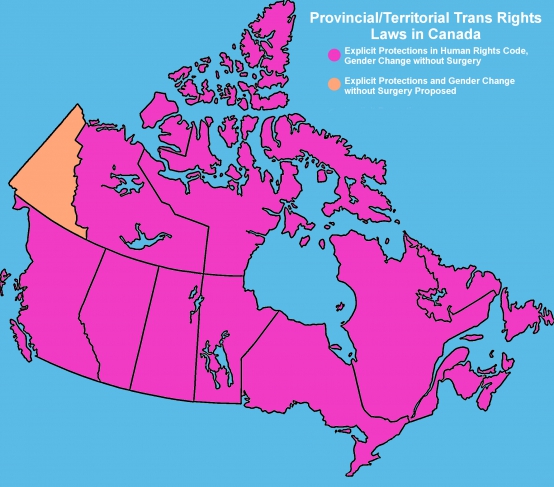Two bills to expand trans rights passed final reading in the New Brunswick legislature on April 26, 2017, bringing the province into line with every other province.
Bill 51 adds “gender identity and expression” as well as “family status” to the list of prohibited grounds for discrimination under the province’s human-rights code, and Bill 37 amends the Vital Statistics Act to give New Brunswick residents the right to legally change the gender marker on their government-issued ID without requiring gender-confirming surgery. The bills will come into effect when they are given royal assent, which should happen next week.
The twin victories cap off a year of mobilization and negotiation by trans activists with the province’s Liberal government.
Sara Hubbard, a member of the transgender support group UBU Atlantic says she “couldn’t be happier” that the bills passed.
“I finally feel like the government has made a major effort to look out for and protect the transgender community,” she says. “If you asked me if this was possible only a few years ago I would have told you not a chance. It is amazing how attitudes have changed here in the province.”
This isn’t the only recent achievement for the trans community in New Brunswick. Gender-confirming surgery was added to the provincial health plan last summer following community demands.
But while the province has rapidly expanded basic protections and services for trans people under the current Liberal government, Hubbard says there’s still more work to do. She’d like to see the health plan expanded to include additional gender-confirming procedures such as breast augmentation, chest contouring and hair removal, as well as additional training for medical professionals about the needs of trans patients.
“The province has made some nice first steps, but there are still more than can be done,” she says.
New Brunswick is the last province to make the legal changes to its human rights code or Vital Statistics Act, although similar changes are now before the Yukon territory legislature. Trans people will soon be explicitly protected by anti-discrimination laws from coast to coast to coast.

C-16, a bill to amend the federal Canadian Human Rights Act and to add trans people to the listed categories under the hate crimes section of the Criminal Code is currently awaiting final reading in the Senate. The Canadian Human Rights Act applies to federally regulated industries, such as Crown corporations, air travel, broadcasting, telecommunications and banks. The provinces regulate everything else.
Prior to the changes, human rights commissions interpreted the protected category of “sex” as including trans people.


 Why you can trust Xtra
Why you can trust Xtra


